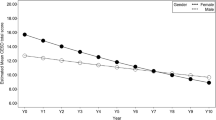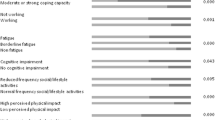Abstract
Our objective was to explore the relationship between psychological distress and subsequent Crohn's disease (CD) activity. Eighteen CD patients were followed prospectively for 2 years at 8- to 12-week intervals. Disease activity was assessed using the Crohn's Disease Activity Index (CDAI). Psychological distress was assessed using the following self-administered questionnaires: Beck Depression Inventory (BDI), Beck Anxiety Inventory (BAI), Beck Hopelessness Scale (BHS), and multiple Holmes Recent Life Changes (RLC) Questionnaires. The effects of psychological distress on current and subsequent CDAI (approximately 8–12 weeks later) were assessed using generalized estimating equations (GEE). The mean CDAI score during follow-up was 138 ± 86, with a median of 121 (range, 0 to 394). BDI scores (possible range of 0 to 63) were independently associated with CDAI scores simultaneously (β =5.64, P=0.004) and 8–12 weeks later (β =6.08, P=0.004). Higher levels of anxiety, hopelessness, and recent life changes were also suggestive of higher CDAI scores, however, their effects were generally of lesser magnitude and not independent of the influence of depressive symptoms. Levels of depressive symptoms are positively associated with future changes in CDAI. Routine psychological assessment may help to identify patients at higher risk for exacerbation.
Similar content being viewed by others
References
Markesich DC, Sawai ET, Butel JS, Graham DY: Investigations on etiology of Crohn's disease. Humoral immune response to stress (heat shock) proteins. Dig Dis Sci 36:454-460, 1991
Okabe N: The pathogenesis of Crohn's disease. Digestion 63 (Suppl 1):52-59, 2001
Ringel Y, Drossman DA: Psychosocial aspects of Crohn's disease. Surg Clin North Am 81(1):231-252, 2001
Latimer PR: Crohn's disease: a review of the psychological and social outcome. Psychol Med 8(4):649-656, 1978
Gerbert B: Psychological aspects of Crohn's disease. J Behav Med 3(1):41-58, 1980
Lask B: Psychological aspects of inflammatory bowel disease. Wien Klin Wochenschr 29;98(16):544-547, 1986
Ramchandani D, Schindler B, Katz J: Evolving concepts of psychopathology in inflammatory bowel disease. Implications for treatment. Med Clin North Am 78(6):1321-1330, 1994
Talal AH, Drossman DA: Psychosocial factors in inflammatory bowel disease. Gastroenterol Clin North Am 24(3):699-716, 1995
North CS, Alpers DH: A review of studies of psychiatric factors in Crohn's disease: etiologic implications. Ann Clin Psychiatry 6(2):117-124, 1994
Sewitch MJ, Abrahamowicz M, Bitton A, Daly D, Wild GE, Cohen A, Katz S, Szego PL, Dobkin PL: Psychological distress, social support, and disease activity in patients with inflammatory bowel disease. Am J Gastroenterol 96(5):1470-1479, 2001
Porcelli P, Leoci C, Guerra V: A prospective study of the relationship between disease activity and psychologic distress in patients with inflammatory bowel disease. Scand J Gastroenterol 31(8):792-796, 1996
North CS, Alpers DH, Helzer JE, Spitznagel EL, Clouse RE: Do life events or depression exacerbatc inflammatory bowel disease? A prospective study. Ann Intern Med 114(5):381-386, 1991
Greene BR, Blanchard EB, Wan CK: Long-term monitoring of psychosocial stress and symptomatology in inflammatory bowel disease. Behav Res Ther 32(2):217-226, 1994
von Wietersheim J, Kohler T, Feiereis H: Relapse-precipitating life events and feelings in patients with inflammatory bowel disease. Psychother Psychosom. 58(2):103-112, 1992
Porcelli P, Zaka S, Centonze S, Sisto G: Psychological distress and levels of disease activity in inflammatory bowel disease. Ital J Gastroenterol 26(3):111-115, 1994
Duffy LC, Zielezny MA, Marshall JR, Byers TE, Weiser MM, Phillips JF, Calkins BM, Ogra PL, Graham S: Relevance of major stress events as an indicator of disease activity prevalence in inflammatory bowel disease. Behav Med 17(3):101-110, 1991
Anton PA: Stress and mind-body impact on the course of inflammatory bowel diseases. Semin Gastrointest Dis 10(1):14-19, 1999
van Hees PA, van Elteren PH, van Lier HJ, Driessen M, Van Hogezand RA, Ten Velde GP, Bakker JH, Van Tongeren JH: An index of inflammatory activity in patients with Crohn's disease. Gut 21(4):279-286, 1980
Yoshida EM. The Crohn's Disease Activity Index, its derivatives and the Inflammatory Bowel Disease Questionnaire: a review of instruments to assess Crohn's disease. Can J Gastroenterol 13(1):65-73, 1999
Beck AT, Steer RA: Beck Depression Inventory: Manual. San Antonio, TX: Psychological Corp (https://marketplace.psychcorp.com/tpc/Default.aspx)
Beck AT, Steer RA, Carbin MG: Psychometric properties of the beck depression inventory: Twenty-five years of evaluation Clin Psychol Rev 8(1):77-100, 1988
von Ammon Cavanaugh S, Wettstein RM: Emotional and cognitive dysfunction associated with medical disorders. J Psychosom Res 33(4):505-514, 1989
Aikens JE, Reinecke MA, Pliskin NH, Fischer JS, Wiebe JS, McCracken LM, Taylor JL: Assessing depressive symptoms in multiple sclerosis: is it necessary to omit items from the original Beck Depression Inventory? J Behav Med 22(2):127-142, 1999
Geisser ME, Roth RS, Robinson ME: Assessing depression among persons with chronic pain using the Center for Epidemiological Studies-Depression Scale and the Beck Depression Inventory: a comparative analysis. Clin J Pain 13(2):163-170, 1997
Lustman PJ, Clouse RE, Griffith LS, Carney RM, Freedland KE: Screening for depression in diabetes using the Beck Depression Inventory, Psychosom Med 59(1):24-31, 1997
Beck AT, Epstein N, Brown G, Steer RA: An inventory for measuring clinical anxiety: Psychometric properties. J Consult Clin Psychol 56(6):893-897, 1988
Beck AT, Weissman A, Lester D, Trexler L: The measurement of pessimism: the hopelessness scale. J Consult Clin Psychol 42(6):861-865, 1974
Miller MA, Rahe RH: Life changes scaling for the 1990s. J Psychosom Res 43(3):279-292, 1997
Singer JD, Willett JB: Applied Longitudinal Data Analysis. Modeling Change and Event Occurrence. New York, Oxford University Press, 2003, pp 45-72, 2003
Diggle PJ, Heagerty P, Liang KY, Zeger SL: Analysis of longitudinal data. New York, Oxford University Press, 2002, pp 245-281
Mayer EA: Psychological stress and colitis. Gut 46(5):595-596, 2000
Levenstein S: Psychosocial factors in peptic ulcer and inflammatory bowel disease. J Consult Clin Psychol 70(3):739-750, 2002
Shanahan F: Brain-gut axis and mucosal immunity: a perspective on mucosal psychoneuroimmunology. Semin Gastrointest Dis 10(1):8-13, 1999
Jantschek G, Zeitz M, Pritsch M, Wirsching M, Klor HU, Studt HH, Rasenack J, Deter HC, Riecken EO, Feiereis H, Keller W: Effect of psychotherapy on the course of Crohn's disease. Results of the German prospective multicenter psychotherapy treatment study on Crohn's disease. German Study Group on Psychosocial Intervention in Crohn's Disease. Scand J Gastroenterol 33(12):1289-1296, 1998
Maunder R: Mediators of stress effects in inflammatory bowel disease: not the usual suspects. J Psychosom Res 48(6):569-577, 2000
Geisser ME, Roth RS, Theisen ME, Robinson ME, Riley JL 3rd: Negative affect, self-report of depressive symptoms, and clinical depression: relation to the experience of chronic pain. Clin J Pain 16(2):110-120, 2000
Smith AB, Selby PJ, Velikova G, Stark D, Wright EP, Gould A, Cull A. Factor analysis of the Hospital Anxiety and Depression Scale from a large cancer population. Psychol Psychother 75(Pt 2):165-176, 2002
Silverstone PH: Concise assessment for depression (CAD): a brief screening approach to depression in the medically ill. J Psychosom Res 41(2):161-170, 1996
Silverstone PH: Poor efficacy of the Hospital Anxiety and Depression Scale in the diagnosis of major depressive disorder in both medical and psychiatric patients. J Psychosom Res 38(5):441-450, 1994
Feagan BG, Vreeland MG, Larson LR, Bala MV: Annual cost of care for Crohn's disease: a payor perspective. Am J Gastroenterol 95(8):1955-1960, 2000
Author information
Authors and Affiliations
Rights and permissions
About this article
Cite this article
Mardini, H.E., Kip, K.E. & Wilson, J.W. Crohn's Disease: A Two-Year Prospective Study of the Association Between Psychological Distress and Disease Activity. Dig Dis Sci 49, 492–497 (2004). https://doi.org/10.1023/B:DDAS.0000020509.23162.cc
Issue Date:
DOI: https://doi.org/10.1023/B:DDAS.0000020509.23162.cc




